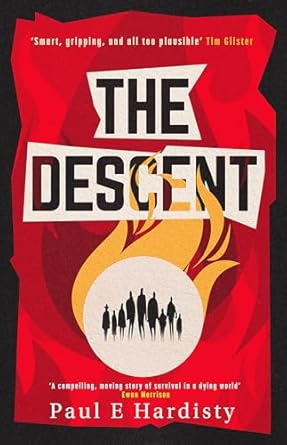3.5 Stars
The Descent is both a prequel and a sequel to Hardisty’s 2023 novel, The Forcing, a book which I loved (https://schatjesshelves.blogspot.com/2023/02/review-of-forcing-by-paul-e-hardisty.html).
There are two timelines. In 2066, Kweku Ashworth, along with his wife Julie and son Leo, sets sail from southern Australia to find missing family and to learn exactly what happened on the sea voyage taken by his stepfather David (Teacher) and his mother Francoise 25 years earlier as they looked for a safe haven from the hellish conditions of a world ravaged by climate change. This timeline shows what happens after the end of The Forcing, and through his discoveries during his travels, Kweku is able to fill in the events Teacher didn’t detail in his written record.
The second timeline covers events from 40 years earlier. Kweku hears a series of radio transmissions in which a woman, who calls herself Sparkplug, reads her journal entries from February 2024 to February 2039. Because she is the personal secretary for the Boss, the ultra-wealthy and ultra-powerful head of a multinational conglomerate, she is privy to the machinations of those like her employer who build sanctuaries for themselves while also maximizing profits by spreading disinformation about climate change. This timeline explains the events that led to the world described in The Forcing.
My experience has been that prequels and sequels are often disappointing. I usually find myself asking whether a follow-up book is really necessary. Is it just a rehash? I must admit that I found The Descent to be less powerful than The Forcing. In the latter, we meet Derek Argent, a villainous businessman who focused on the growth of his personal wealthy, exploited others, and sowed doubt by spreading disinformation about climate change. The Descent details exactly how the Boss and his ilk ruthlessly lie, manipulate, and exploit in order to profit. There’s nothing new here. Nonetheless, it is interesting to see how easily the Boss is able to accomplish what he wants.
The novel is terrifying in its realism. Sparkplug’s diary begins in February 2024, the month of this book’s release, and refers to current events like the war in the Ukraine. Reference is made to things that are currently happening: “national debt in the major countries continued to balloon, with real wealth increasingly concentrated in the hands of a very small and increasingly wealthy powerful group of people . . . the completely inadequate, conscience-assuaging efforts to combat [climate change], a series of empty national pledges . . . a global rise in fascism, and the perils of not acting decisively to reduce global greenhouse-gas emissions.” These actions, or lack thereof, are shown to lead directly to a dystopian near-future.
There are parallel characters between fiction and reality. For instance, Ellie Dahlberg, a Swedish climate activist, is obviously intended to be Greta Thunberg. The “big blue rocket” that looks “like a huge boner” surely refers to Jeff Bezos’ Blue Origin. And Bragg (oh what a perfect name) is a stand-in for Donald Trump who is described as having “a strangely over-pigmented complexion . . . and a mullet hairdo” who boasts “like he’s some kind of successful businessman.” At times, I felt that the book was a warning about the dangers of re-electing Trump.
There is suspense in the plot, but the ocean voyage doesn’t come across as dangerous as I expected. Kweku and Julie seem to quickly and easily find the people they need to find to help them. They seem to have a lot of luck. And there’s a deus ex machina moment involving the U.S. navy. The addition of Fema bothered me; I immediately recognized her as a redshirt because she just seems to drift in and out of the narrative: sometimes she is mentioned and sometimes it’s as if she’s not travelling with them.
As in The Forcing, there is, despite the dire
state of the planet, some hope. Near the
end, there’s discussion of actions that could be taken now: “legislation taxing carbon and diverting the
proceeds into renewable energy projects . . . climate-adaptation projects . . .
including building seawalls, re-establishing coastal wetlands, and re-greening
cities.” The warning is that “it was
way, way more expensive, and way harder to fix something after it broke than to
prevent it from breaking in the first place.”
I recommend The Descent to those who have read The Forcing. The latter works as a standalone, but I'm not sure the former would. The Descent details the decisions and actions which create the world of The Forcing, but for me lacks the gut-punch impact of the first book.







